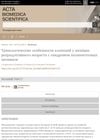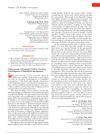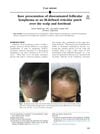 82 citations,
January 2000 in “Hormone Research in Paediatrics”
82 citations,
January 2000 in “Hormone Research in Paediatrics” DHEA stimulates skin oil glands and could help postmenopausal women, with potential for acne and excessive hair growth treatments.
[object Object] September 2019 in “Clinical research in practice” High-dose finasteride effectively treats hair loss in postmenopausal women.
 August 2019 in “Journal of The American Academy of Dermatology”
August 2019 in “Journal of The American Academy of Dermatology” Platelet-rich plasma helps hair regrowth and improves quality of life in women with hair loss, but minoxidil may be more effective.
 11 citations,
September 2019 in “Dermatologic Surgery”
11 citations,
September 2019 in “Dermatologic Surgery” A substance called Vascular Endothelial Growth Factor can protect certain hair follicle stem cells from damage caused by androgens, suggesting a new possible treatment for hair loss.
 6 citations,
September 2019 in “Journal of Cosmetic Dermatology”
6 citations,
September 2019 in “Journal of Cosmetic Dermatology” Laser treatment effectively increases hair density and thickness in androgenic alopecia.
 25 citations,
May 2020 in “Aesthetic Surgery Journal”
25 citations,
May 2020 in “Aesthetic Surgery Journal” The regenerative solution, tSVF, is a safe and effective treatment for various conditions like aged skin, scars, wounds, and more, but more research is needed to find the best way to use it.

Higher free testosterone levels can increase bone density and decrease body fat but may raise the risk of prostate cancer, hair loss, and benign prostate enlargement.
 7 citations,
August 2019 in “Journal of Ovarian Research”
7 citations,
August 2019 in “Journal of Ovarian Research” Blood removal and birth control pills both helped with hormone levels in women with PCOS, but birth control was better for regular periods and blood removal had fewer side effects.
 1 citations,
December 2017 in “Acta biomedica scientifica”
1 citations,
December 2017 in “Acta biomedica scientifica” Women of reproductive age with polycystic ovary syndrome often experience hair loss.
 17 citations,
September 2017 in “Journal of Cosmetic Dermatology”
17 citations,
September 2017 in “Journal of Cosmetic Dermatology” Women with PCOS in North China often have hirsutism and acne, with hirsutism linked to metabolic issues.
 October 2024 in “Comprehensive Health and Biomedical Studies”
October 2024 in “Comprehensive Health and Biomedical Studies” Smoking and alcohol worsen hair transplant results.
 March 2020 in “Journal of Laser Applications”
March 2020 in “Journal of Laser Applications” Photobiomodulation therapy significantly increases hair density and growth for androgenic alopecia, but more research is needed to confirm safety.
 June 2019 in “Brain Imaging and Behavior”
June 2019 in “Brain Imaging and Behavior” Hair loss can indicate brain aging and potential small vessel disease, but more research is needed to understand the clinical impact.
 13 citations,
June 2016 in “Dermatologic Therapy”
13 citations,
June 2016 in “Dermatologic Therapy” Minoxidil works better when applied on a damp scalp than a dry one.
 1 citations,
April 2016 in “Journal of Investigative Dermatology”
1 citations,
April 2016 in “Journal of Investigative Dermatology” Prostaglandin D2 increases testosterone levels in skin cells through reactive oxygen species, not enzymes, which could lead to new hair loss treatments.
 3 citations,
July 2019 in “Experimental Dermatology”
3 citations,
July 2019 in “Experimental Dermatology” Hair loss patients may have different polyamine levels in various scalp areas.
 32 citations,
June 2019 in “Frontiers in Endocrinology”
32 citations,
June 2019 in “Frontiers in Endocrinology” Polycystic Ovary Syndrome (PCOS) is common in women with conditions like anovulation, hirsutism, hair loss, and type 2 diabetes, and it can lead to health risks like heart disease, obesity, insulin resistance, and depression. Non-Classic Congenital Adrenal Hyperplasia (NC-CAH) is also discussed.
 11 citations,
June 2019 in “Tissue & Cell”
11 citations,
June 2019 in “Tissue & Cell” Hair stem cells produce a protein called COL17A1 that plays a key role in their development and is linked to hair thinning and baldness.
 6 citations,
August 2019 in “Indian drugs”
6 citations,
August 2019 in “Indian drugs” Ethosomes improve drug delivery through the skin and show promise for treating male pattern baldness.
 49 citations,
March 2019 in “Journal of Investigative Dermatology”
49 citations,
March 2019 in “Journal of Investigative Dermatology” Skin fat plays a key role in immune defense and healing beyond just storing energy.

Hair aging leads to color loss and reduced density, and dermatologists are key in treating it to improve quality of life.
 4 citations,
June 2019 in “International Journal of Dermatology and Venereology”
4 citations,
June 2019 in “International Journal of Dermatology and Venereology” Some skin diseases may indicate a higher risk of metabolic syndrome and related health issues.
 September 2024 in “Ain Shams Medical Journal”
September 2024 in “Ain Shams Medical Journal” Androgenic alopecia causes hair thinning, and treatments include minoxidil, finasteride, and light therapy.
 3 citations,
January 2020 in “Skin appendage disorders”
3 citations,
January 2020 in “Skin appendage disorders” In Spain, dermatologists most commonly prescribe topical minoxidil and oral finasteride for male hair loss, and topical minoxidil and oral contraceptives for female hair loss. The use of oral dutasteride and oral minoxidil has significantly increased over the past three years.

A woman's excess male hormone symptoms were caused by a rare benign tumor in her ovary.
[object Object]  2 citations,
March 2019 in “Plastic and Reconstructive Surgery”
2 citations,
March 2019 in “Plastic and Reconstructive Surgery” The letter suggests that a modified fat processing technique may increase regenerative cells but calls for more trials to confirm its effectiveness for skin and hair treatments.
 1 citations,
April 2019 in “JAAD case reports”
1 citations,
April 2019 in “JAAD case reports” A woman with lymphoma had a rare skin rash on her scalp and forehead, which was hard to diagnose but responded well to treatment.
 1 citations,
April 2019 in “Endokrynologia Polska”
1 citations,
April 2019 in “Endokrynologia Polska” Healthy diet and exercise are important for women with PCOS to manage weight and metabolic issues, and supplements like omega-3, vitamin D, and inositol may help.
March 2017 in “Jurnal materi dan pembelajaran fisika” Light diffraction helps in eye surgery, brain treatments, and detecting hair loss and genetic diseases.
 6 citations,
May 2021 in “Clinical Chemistry and Laboratory Medicine”
6 citations,
May 2021 in “Clinical Chemistry and Laboratory Medicine” Different ACE2 gene versions may affect COVID-19 impact based on age and suggest some hair loss drugs could be potential treatments.




























